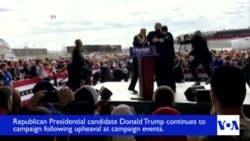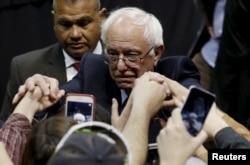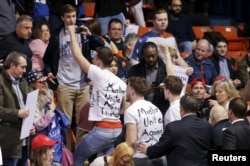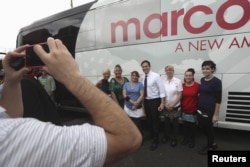Leading U.S. Republican presidential contender Donald Trump is denying any responsibility for the violence that has erupted at his political rallies, and is defending his supporters who have been charged with assaulting protesters.
"We're not provoking. We want peace. ... We don't want trouble,'' he told a large crowd in Bloomington, Illinois, the first of two comparatively docile events on Sunday.
His denials came even as political rivals continued to blame him for sowing the seeds of anger that have led to the violent confrontations.
Fights and pushing and shoving have broken out between his supporters and protesters opposing his candidacy at rallies in several states where key Republican nominating primary contests are set for Tuesday.
Authorities have arrested a small number of protesters, some inside his rallies in Illinois, Missouri, North Carolina and Ohio, and others outside on nearby streets.
WATCH: Campaign supporters, protesters clash at weekend events
In Illinois Sunday, Trump assured his backers that their frustration is righteous rage against a corrupt political and economic system. He cast his naysayers as "bad people'' who "do harm to the country.''
The billionaire real estate mogul instead cast blame on Democratic candidate Bernie Sanders for the increasingly frequent disruptions and threatened to retaliate by sending his supporters to Sanders' rallies.
No organized protest
Sanders said some of his supporters had disrupted the Trump event, but that his campaign played no role in organizing the anti-Trump protest.
At one Trump rally outside Dayton, Ohio on Saturday, a protester charged toward the stage where Trump was speaking in an airport hangar. But Secret Service agents guarding Trump intercepted the demonstrator before he reached the candidate.
At another Trump rally last week in the mid-Atlantic state of North Carolina, a 78-year-old Trump supporter sucker-punched a protester as security guards escorted the demonstrator out of the gathering.
The Trump supporter was charged with assault, with Trump telling NBC’s Meet the Press on Sunday that the man “got carried away.” Trump said he had instructed his aides to look into paying the man’s legal fees to handle his court case.
Fellow Republicans
Trump’s Republican challengers, Texas Senator Ted Cruz, Florida Senator Marco Rubio and Ohio Governor John Kasich, as well as Democratic presidential candidate former secretary of state Hillary Clinton, all blamed Trump for the marked turn toward physical confrontations at his political rallies.
All of Trump’s Republican challengers have pledged to support him if he wins the party’s presidential nomination at the Republican national convention in July, after the end of the state-by-state nominating contests.
Wavering on commitment
But both Rubio and Kasich say they are wavering in their commitment should Trump get the nomination.
“I think a significant number of Republicans will not vote for Trump,” Rubio said, if the New York developer is the party nominee in the November national election, quite possibly against Clinton, the leading Democratic candidate.
Rubio said, “It’s getting harder every day to justify” his pledge to support Trump if he wins the Republican presidential nomination.
US Presidential Candidate Delegate Count
Delegate Count
Here is an estimated delegate count for each candidate:
Republicans
Donald Trump: 621
Ted Cruz: 396
John Kasich: 138
Democrats
Hillary Clinton: 1,561
Bernie Sanders: 800
Total delegates needed for party nomination:
Democrats: 2,383
Republicans: 1,237
* As of March 16, 2016
Cruz, a conservative agitator in the halls of Congress against both Republican and Democratic leaders, said Trump “would be a disaster” in a general election matchup against Clinton.
The party primary elections and caucuses are apportioning delegates to the Republican and Democratic national conventions in July, where the presidential nominees will be formally selected. Trump and Clinton both are leading the races for their party nominations, but neither is close to the majority of convention delegates needed to claim victory.
Until now, all the state nominating contests in both parties have split the awarding of delegates roughly along the lines of the vote counts in each state.
But on Tuesday, in both Florida and Ohio, the winning Republican contenders will collect all the delegates, 99 in Florida and 66 in Ohio, in winner-take-all primaries.
Trump has been leading Rubio in Florida, but is locked in a close race in Ohio with Kasich, who governs the Midwestern state.
Clinton and Sanders will continue to collect pledged convention delegates roughly based on their vote totals in each state, not winner-take-all.
In Ohio's capital Sunday, Democrats got to compare the party's top presidential contenders up close ahead of Tuesday's primary. About 3,200 people gathered for the party's annual dinner at the Columbus convention center to hear from Bernie Sanders and Hillary Clinton.
Correction: Due to an erroneous Associated Press report, an early version of this story indicated that Bernie Sanders responded to Donald Trump's suggestion that he would send his supporters to Sanders campaign events by saying "Send them. They deserve to see what a real honest politician sounds like.'' Sen. Sanders did not say or Tweet that statement.











